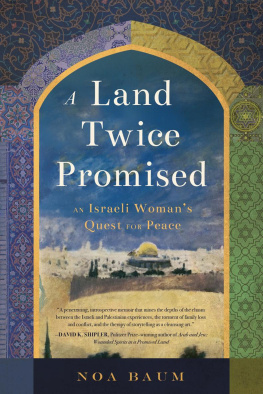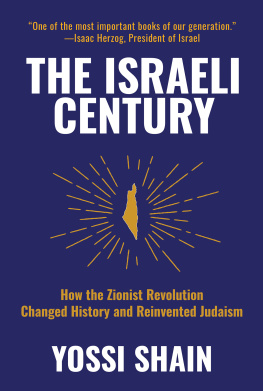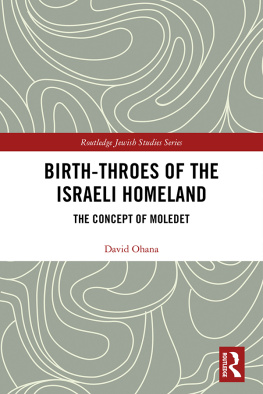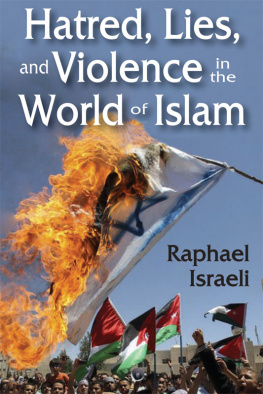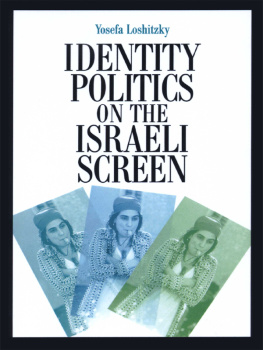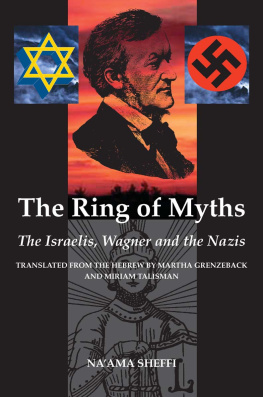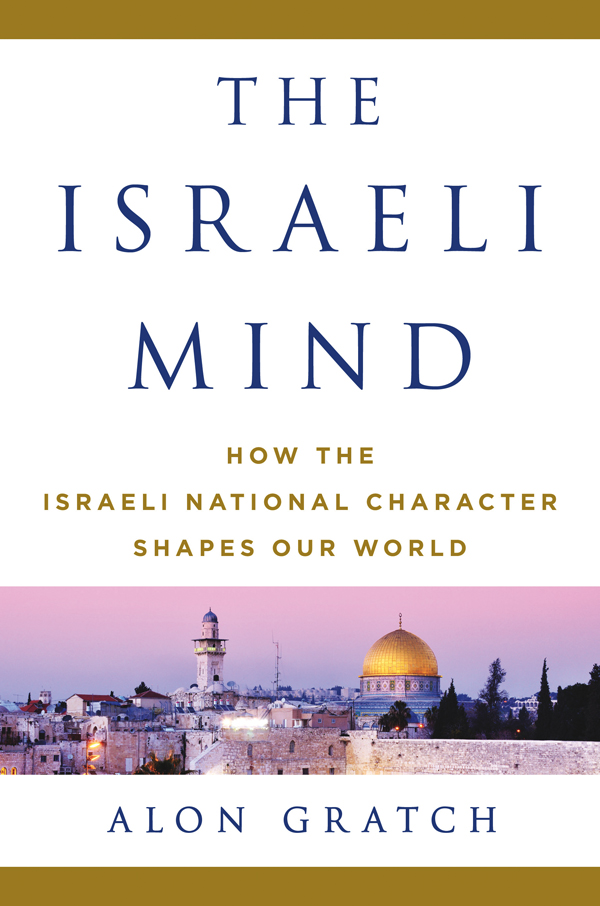Contents
Guide

The author and publisher have provided this e-book to you for your personal use only. You may not make this e-book publicly available in any way. Copyright infringement is against the law. If you believe the copy of this e-book you are reading infringes on the authors copyright, please notify the publisher at: us.macmillanusa.com/piracy.
TO MY MOTHER,
HAYA GRATCH,
AND MY LATE FATHER, AVRAHAM GRATCH
The rabbi took to the podium. He blessed and praised the bar mitzvah boy, my son. Then, asking the congregants to be seated, he proceeded to deliver a sermon on Israels recent military excursion into Gaza. Explaining and justifying Israels behavior, he concluded with an emotional pitch, declaring that the 1967 Middle East war was Israels finest hour.
At that moment one of the bar mitzvahs guests, an Israeli businessman in his fifties, stood up. Rabbi, he implored with urgency, I object to these statements!
A hush fell over the large, ornate sanctuary. Unflustered, the rabbi respectfully replied, My friend, why dont the two of us schmooze about this after the service.
But the man, who sat right behind my wife and me and who happened to be my brother, shot back, No, Rabbi, Id like to address the congregation.
Sorry, I cant let you do that.
I just want to say one word, my brother insisted.
As I was contemplating what that one word could possibly be, I heard my wifean exceptionally gracious and well-mannered Americanmouthing to my brother, Ariel, if you dont stop this, Im going to kill you!
Not skipping a beat, Ariel retorted, Some causes are worth dying for.
But he took his order, sat down, and allowed the service to resume. As you may have gathered by now, my brother shares little more than a first name with the former Israeli prime minister who had sent those troops into the Gaza Strip. Except for one thing, of coursethey are both Israelis.
I suspect this confrontation was a first for this rabbi, as well as for the congregation as a whole, which resides peacefully in an upscale suburb just north of New York City. It certainly provided for a lively background conversation for the rest of the day, when the festivities reconstituted in a tranquil, waterfront country club a couple of miles away. But there, too, notwithstanding the genteel ambience of the Waspy venue, the Israeli mind continued to make itself present.
Perhaps because my wife and I are both psychologists, or simply because we are not religious people, our sons bar mitzvah celebration did not follow the standard format. Among other things, we had asked seven men who had played an important role in our family life to say to our son a few public words of advice about becoming a man, which is what a bar mitzvah is supposedly about. We chose my father-in-law, my two brothers, three family friends, and my father and gave them some rather specific instructions. My father-in-law and our three American friends followed the directions. They recited some well-prepared, truly memorable crumbs of touching, funny, and adolescent-friendly advice.
You already met one of my brothers, Ariel. His advice, true to form, was always follow your gut. But now it was my other brothers turn to follow his gut or, more accurately, march to his own tune. Taking his turn, Eli proudly announced he did not prepare anything. He congratulated my son warmly and sat down. Unlike Ariel, he made no political proclamations, yet that was hardly outside his repertoire. Ten years my senior, Eli was twenty-one in 1969 when he campaigned for Israels perpetual right-wing candidate Menachem Begin, heading up one of his Jerusalem offices. Shortly thereafter he changed his last name from Gratch to Gadot. This was not inconsistent with common practice at that time, as many Israelis hebraized their European last names to conform to the ideal of the new Israeli Jew. But in a personal demonstration of his love for Greater Israel, Eli chose a name that translates to riverbanks, referring to both banks of the Jordan River. It was taken from the right-wing revisionist school of Zionism, which envisioned not only the West Bank, but also the rest of historical Palestine, including the territory of the sovereign state of Jordan, as part of Israel. Years later, after he got married and passed his name on to his children, Mr. Gadot had a complete change of heart, ending up on the extreme left, where ceding the West Bank and even East Jerusalem to the Palestinians was acceptable. But he and his like-minded offspring are now stuck with the Gadot name.
Last but not least on the speakers list cameor more accurately didnt comemy father. Earlier he had told me he was going to tell the following tale from his own bar mitzvah. Shortly before he was born in Turkish-ruled Palestine of 1918, his own father was expelled to Syria because, not wanting to fight against the Allies in World War I, he had dodged the Turkish draft. His father therefore could not attend his bris, the religious ritual of circumcision performed on Jewish boys. But while in Damascus he had vowed that he would at least make it to his sons bar mitzvah. Well, he did, and on that occasion he told my father this whole story. Now when I came to your sonsmy youngest grandsonsbris, my father told me, I vowed that I would make it to his bar mitzvah, to complete the cycle. Which he would, by traveling from Jerusalem to New York at age eighty-six, and preparing to tell this tale. Except that after he ran this by my mother, she apparently vetoed it, ruling that the story had nothing to do with my sons bar mitzvah and therefore was inappropriate. So notwithstanding my encouragement, my father decided against this speech. Instead, my mother helped him write something appropriately didactic about my sons coming of age, which he was going to read. But at the event, after the first six men spoke and my wife introduced my father as a man who survived five wars, three boys, and a fifty-eight-year-long marriage, my mother stood up and walked to the podium. Explaining that my father was not feeling well, she proceeded to read his speech.
Now lest you think my mother was an anomaly and it was principally the men in my family who followed their gut or marched to whatever tune came out of it, I should also mention a sister-in-law who announced she would not wear any shmatte on her head as required by the synagogue, and a niece who told my son she did not believe in God and would therefore not accept the honor of opening the ark, and also, why was he going through this entire charade if he, too, as he responded, did not believe in God?
* * *
I am a New Yorkbased clinical psychologist and author. I was born and grew up in Jerusalem, the third and youngest son in a family with unusually deep roots in the Holy Land. One of my most vivid childhood memories was from the morning of June 5, 1967. A fourth grader at the time, I was on my way to school, pushing uphill on Ussishkin Streetnamed after an early, Russian-born Zionist leaderwhen a loud siren sounded. It was not the long, single-pitch siren used to signal a moment of silent standing on Holocaust and Memorial days, but rather the continuous ascending and descending one signaling war. I paused and looked around. Several other pedestrians did the same. Then, as if by unspoken consensus, we decided it was a false alarm or just another drill. We resumed walking. But when I arrived at school, it turned out to have been the real thing. War was coming, and some four hundred kids were gathered in the basement gym waiting to be picked up by their parents. By noon, when all but me and a friend who lived across the street from me had been picked up, our teacher paired us up and told us to walk home together. About halfway through our fifteen-minute walk home we started hearing explosions. Loud booms of mortar rounds were punctuated by more distant echoes from semiautomatic guns. We knew that a couple of blocks away from our street, in the Valley of the Cross, which lay beneath the Israeli Museum, the Israeli Defense Forces stationed a camouflaged artillery unit. We also knew that the prime ministers house, also nearby, was a potential target for Jordanian shelling. All this did not stop my fatherwho pulled over in his car driving back from work just as my friend and I reached our blockfrom suggesting that I accompany him to the corner grocery store. So only after we had bought food for several days did my father and I join our neighbors in the small shelter of our five-story apartment building. Some of our neighbors also took their time trickling into the shelter, whose entrance had only recently been secured by a few of us with a wall of sandbags.


